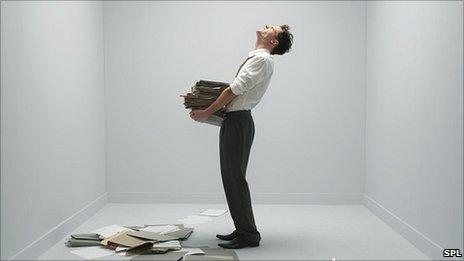Work stress hits people in and out of work
- Published

Work stress has been increasing in recent months, the report says
The global economic downturn led levels of work-related stress in the UK to soar, a British Academy report says.
Author Tarani Chandola, a University of Manchester sociologist, says those who kept jobs during the recession are affected as much as those left jobless.
He said that in each of the last two years, work stress levels rose by more than 4%, compared to annual rises between 0.1% and 1% from 1992 to 2009.
A CBI spokesman said businesses took staff health very seriously.
The report states that severe stress could trigger depression, anxiety, workplace injuries and suicide, and lead to a greater risk of heart disease.
Professor Chandola compiled existing evidence from peer-reviewed journals and major UK surveys to obtain a comprehensive view of work-related stress.
Women hit hardest
He told ҙуПуҙ«ГҪ News that work stress had been increasing steadily in Britain since the 1990s, but warned it had especially increased in the last recession.
"It's likely to continue to increase because of the determinants of work stress: changes in working conditions and the government spending," he added.
The report says that the public sector will be the most affected, and Professor Chandola said it was in the public sector that people have reported a significant increase in work hours.
The report warns job insecurity and unemployment rates tend to go hand in hand - whenever one of these factors rises, the other one jumps up as well.
"And [since] there are more women in the public sector workforce than men, that's why we expect to see this effect hitting women workers particularly," said Professor Chandola.
He said that since there was no law in the UK that forced managers to tackle their employees' stress levels, it was impossible to know for sure what exactly employers were doing for their staff.
The Health and Safety Executive, which oversees workplace health, safety and welfare, has set up a number of management standards on tackling work stress.
These standards suggest surveying employees regularly to keep on track of any potential problems of work-related anxiety or depression in the work force. They also propose different action plans to actively reduce stress in a company.
And Neil Carberry, of the Confederation of British Industry (CBI), which represents around 200,000 British businesses, told ҙуПуҙ«ГҪ News: "Employers take the well being of staff very seriously.
"As the recent CBI/Pfizer absence and workplace health survey showed, many companies have strategies in place to address issues, such as workplace stress, and recognise the benefits of doing this for both the business and employees alike."
Huge costs
Professor Chandola said employees, employers, as well as the government, have to deal with the work stress issue together.
"The trouble is, there are economic consequences of work stress," explained the researcher, adding that the eventual cost for individuals and for wider society are usually much greater than the cost employers have to bear.
The report says many UK's public sector workers have been worrying about losing their jobs
He added that these health consequences could be huge - encompassing the costs of treatment for mental well-being and other conditions, as well as lost productivity due to illnesses, including cardiovascular disease.
Professor Chandola added there was also an effect on how people saw themselves when they were out of work. "You feel that you have less value because you're not a productive member of society," he said.